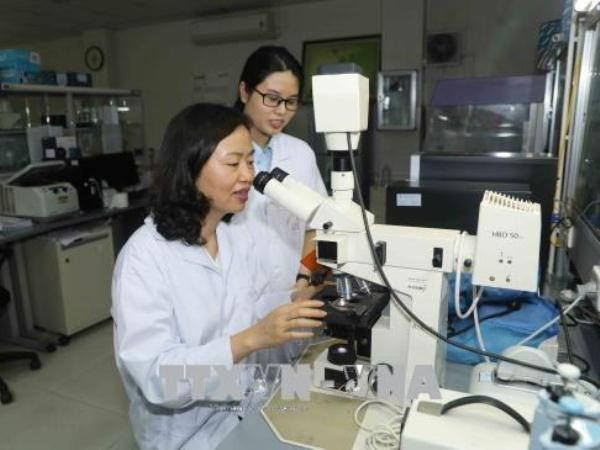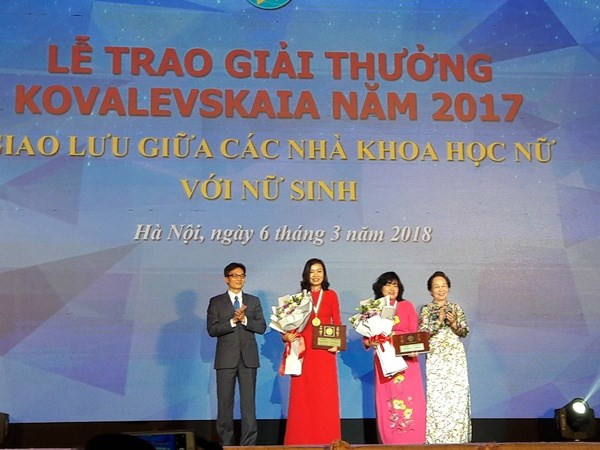Female scientist sets record as youngest person to receive Kovalevskaia Prize
Receiving this prestigious award at the age of 43, Associate Professor Tran Van Khanh became the youngest scientist to be awarded the Kovalevskaia Science Award in Vietnam over the past 30 years.
 |
| Associate Professor Tran Van Khanh (sitting on the right) conducts research in the laboratory with colleagues. Photo: Phuong Hoa/VNA |
The 2017 Kovalevskaia Science Prize, which was awarded on March 6, went to Associate Professor Tran Van Khanh, Hanoi Medical University.
Screening for faulty genes from parents to fetusesWith the main research direction on genes, a field that according to Associate Professor Tran Van Khanh, around 2000, when she first did research, in Vietnam, gene technology was not yet developed much and was considered a very advanced field by everyone. However, she was still determined to pursue it because she understood that, in medicine, the trend of treating diseases according to the individual is very important, even though it is a disease, it can be treated according to the mechanism of each person's genetic characteristics.
Associate Professor Tran Van Khanh's research has achieved many important results, making practical contributions to disease treatment such as research on stem cells, cancer, building a gene treatment process for Duchenne muscular dystrophy, protein synthesis...
First of all, we must mention a series of research projects related to prenatal diagnosis of genetic diseases, pre-implantation diagnosis to screen for some sex chromosome-linked genetic diseases.
Associate Professor Tran Van Khanh has chaired 8 projects and is a main member participating in 4 scientific research projects focusing on prenatal diagnosis of some genetic diseases and pregnant women.
These studies have helped in prenatal diagnosis of genetic diseases, diagnosis of gene carriers and genetic counseling for patients and their blood relatives. To date, more than 1,000 patients and their family members have been diagnosed using genetic techniques, detecting healthy carriers of disease genes and predicting their birth.
From these diagnoses, many children have been born completely healthy, consistent with the genetic status results of prenatal diagnosis.
In particular, with the results achieved, the gene mutation map of these diseases in Vietnamese patients has been initially published. The completion of the gene mutation map has helped the research team continue to build orientations for gene therapy.
With the topic “Building a pre-implantation diagnosis process using Microsatellite DNA technology to screen for some genetic diseases linked to sex chromosomes,” Associate Professor Khanh’s research team conducted embryo diagnosis using gene analysis techniques from only one cell that was secreted on the IVF embryo in the first three days. Then, embryos with absolutely no chromosomal and genetic abnormalities were selected to be implanted back into the mother’s uterus.
This is a very early stage of screening diagnosis, ensuring that most children are born without genetic diseases. Previously, when this technique was not yet implemented in Vietnam, families had to go to Thailand or other developed countries to perform the technique at a cost of up to over 500 million VND. The success of this technique in Vietnam will help reduce the cost significantly to only half, or even 1/3 of the cost of performing it abroad.
 |
| Associate Professor Tran Van Khanh (in red ao dai) received the Kovalevskaia Award in 2017. Photo: CTV/Vietnam+ |
"Just hope to find new results to apply in treatment"
Another research direction that is also carried out at Associate Professor Tran Van Khanh's Research Center is cancer research. She and her colleagues at the Center have carried out many ministerial and state-level projects on molecular pathology in cancer, applications in early diagnosis, monitoring and prognosis of some types of cancer, and research to evaluate genes related to cancer.
The results from these studies have improved the method and proposed some early cancer diagnostic markers such as EGFR, HIP, AID... Some factors to monitor treatment response for cancer patients have also been applied clinically such as EBV-DNA, HBV-DNA concentration... at the Central Cancer Hospital and the Center for Nuclear Medicine and Oncology, Hanoi Oncology Hospital, Bach Mai Hospital.
In particular, research on targeted therapy has identified treatment-sensitive gene mutations and treated nearly 1,000 patients. The results show that patients have outstanding treatment effectiveness, reduced cancer symptoms, no drug side effects, disease-free survival time and overall survival time significantly increased, bringing extremely practical benefits to patients.
Many molecular-level disease diagnosis processes, products of scientific research topics, have been applied clinically to serve patients such as: Process of determining gene mutations that determine drug response in cancer treatment; Process of culturing and activating immune cells applied in cancer treatment; Process of pre-implantation diagnosis, prenatal diagnosis of genetic diseases at the gene level: Duchenne muscular dystrophy, Hemophilia, Wilson's disease, Spinal muscular degeneration, Congenital adrenal hyperplasia, osteogenesis imperfecta, α, β thalassemia...
The successful implementation of these procedures in clinical practice has greatly contributed to treatment, disease prevention and genetic counseling.
In addition to funding from state-level research projects, Associate Professor Tran Van Khanh and his colleagues have sought funding from companies for about 500 poor cancer patients to undergo genetic testing.
However, the female associate professor modestly shared: "When I come into contact with patients every day and every hour, understanding the pain they have to endure, I think I have to do something useful for them. All of my research and that of my colleagues only hope to find new results to apply in diagnosis and treatment for people."
Passionate about scientific research, Associate Professor Tran Van Khanh said she always had to leave early and come home late, often arriving home at 7 p.m. "At that time, my child said: Mom, I'm so hungry!" Associate Professor Khanh said.
Sharing about the difficulties of women doing scientific research, Associate Professor Tran Van Khanh confided: "I have this result, in addition to my own efforts, I also have to thank the active support of colleagues, the sympathy and support of my husband, children and family. Doing science seems dry, but I still maintain my hobby of growing flowers and arranging flowers artistically, or after a tiring day, I go into the kitchen to cook a delicious dish for my family. That is also a way for me to balance my life./."

